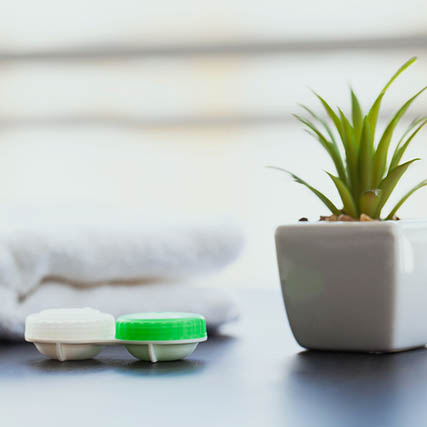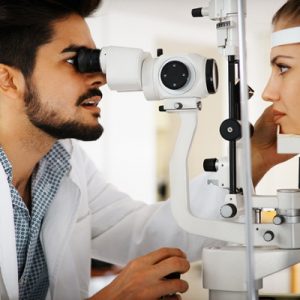While soft contact lenses have become quite popular in recent years, hard contact lenses are actually preferred by many people with specific vision conditions.
What are hard contact lenses?
If you hear your optometrist using the terms ‘gas permeable lenses’, ‘GP lenses’, ‘rigid gas permeable lenses’, ‘RGP lenses’, or ‘oxygen permeable lenses’, you can be certain they are referring to hard contact lenses.
Gas permeable lenses are more rigid than soft lenses and are known for their increased oxygen permeability. Although they are rigid, they should not be confused with their predecessors, the old fashioned hard contact lenses which are no longer prescribed.
Therefore, for the purpose of this article, we will refer to hard lenses as gas permeable (GP) lenses.
Contact an eye doctor near you to find out if GP lenses are a good fit for you.
Soft lenses versus GP lenses
Gas permeable lenses were created in the late 1970s and are actually more technologically advanced than soft contact lenses.
Unlike soft lenses which are made of silicone hydrogel and are both thin and flexible and large enough to cover the entire corneal surface, GP lenses are more rigid, and only cover around 75 percent of the corneal surface.
Although GP lenses are more rigid than soft lenses, many GP lenses contain silicone, making them more flexible than the hard lenses of previous years.
Silicone also allows oxygen to permeate through the lens to reach the cornea— a process that is absolutely necessary when wearing contact lenses to maintain corneal health.
Some recent GP lens designs have an even higher oxygen permeability than many soft contact lenses, and are similar to soft lenses designed with silicone hydrogel when it comes to oxygen transmission.
Gas permeability lenses are also designed to move more on the corneal surface, which allows tears to flow under the lens and deliver oxygen to the cornea.
What are the benefits of GP lenses?
Gas permeable lenses offer many benefits to contact lens wearers:
Clearer vision: GP lenses are designed from rigid plastic, so they maintain their shape throughout the day— even when you blink, enabling clearer, sharper vision.
Durability: GP lenses are not easily torn or chipped and therefore last much longer than soft lenses.
Resistance to protein and lipid deposits: GP lenses are not designed with materials composed of water, so protein and fatty deposits from your tears will not stick to the lenses.
Affordability: GP lenses last for up to a year or more and therefore don’t need to be replaced as often— making them less expensive than soft lenses.
Schedule an appointment with an eye doctor near you to see if GP lenses are the best fit for you.
SEE RELATED: How to Insert and Remove Hard Contact Lenses
Who can benefit from GP lenses?
While GP lenses are not for everyone, many people choose to wear them for correction of the following vision problems:
- Astigmatism– GP lenses are prescribed when soft contact lenses don’t provide clear enough vision.
- Presbyopia– GP lenses are available in a variety of bifocal and multifocal designs and provide increased visual acuity.
- Keratoconus– GP lenses provide the clearest vision possible to help correct severe vision difficulties.
- Corneal Conditions– GP lenses can be prescribed for a range of corneal distortions or fragile corneas.
- Myopia management – GP lenses are used for ortho-k treatments and are worn overnight to reshape the cornea in an attempt to stop or slow down the progression of myopia.
Gas permeable lenses may also be prescribed for people who require contact lenses following laser refractive surgery.
What are the disadvantages of GP lenses?
While there are many advantages to wearing GP lenses, there are disadvantages as well.
The most common disadvantages include:
Adaptation period. One of the main drawbacks to wearing GP lenses is the adaptation period that comes along with these lenses. Unlike soft lenses which are instantly comfortable upon insertion, GP lenses can take some time to get used to.
For maximum comfort, GP lenses should be worn regularly to avoid additional periods of adaptation.
Smaller size. Since GP lenses are smaller than soft lenses, they are more likely to fall out while exercising or playing sports.
Risk of corneal conditions. GP lenses are designed to move on the eye upon blinking in order to allow oxygen to reach the cornea. However, as the lens moves, there is an increased risk of dust and debris getting lodged under the lens— increasing the risk of eye irritation, corneal abrasion, and even infection.
Strict lens care routine. In order to keep GP lenses clean and safe to use on a daily basis for a long period of time, it is important to follow a strict lens care routine involving many different lens care products. For some people, this may be difficult as it is both time consuming and costly.
What does a lens care routine look like?
Lens care routines are performed after GP lenses are removed each night. While there are many different products available, each type of lens will require different treatment.
Most lens care systems involve cleaning, soaking, wetting, and disinfecting the lenses using the following products:
- Daily cleaner removes tear film oils, makeup, mucus, and other dirt and debris from the surface of the lens.
- Wetting and soaking solution is used for lens storage and lens reinsertion to kill bacteria and keep the lenses from warping. The solution also helps to support the lenses in the eyes.
- Enzymatic cleaner (optional) is used for patients who have a lot of protein build up on the surface of their lenses.
- Lubricating and rewetting eye drop is used while wearing the lenses to help flush out any debris from under the lenses and enable the lenses to move around more comfortably in the eyes.
Some newer products have combined some of the solutions in order to reduce the amount of lens care products required, but these products should be approved by an optometrist before use to ensure their suitability for specific GP lenses.
LEARN MORE: Optical and Contact Lenses
If you are interested in switching from soft lenses to GP lenses, contact an eye doctor near you to determine if you are an ideal candidate for these lenses.
Gas permeable lenses can provide clearer, sharper vision for improved daily performance and enhanced quality of life.










